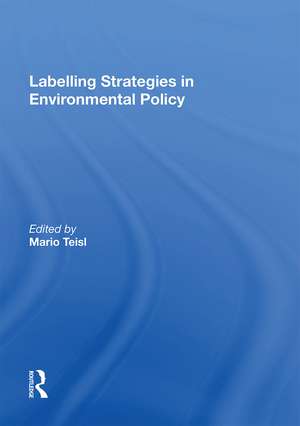Labelling Strategies in Environmental Policy
Editat de Mario Teislen Limba Engleză Paperback – 28 feb 2022
Preț: 235.60 lei
Nou
Puncte Express: 353
Preț estimativ în valută:
45.09€ • 46.90$ • 37.22£
45.09€ • 46.90$ • 37.22£
Carte disponibilă
Livrare economică 24 martie-07 aprilie
Livrare express 07-13 martie pentru 44.84 lei
Preluare comenzi: 021 569.72.76
Specificații
ISBN-13: 9781138356313
ISBN-10: 113835631X
Pagini: 570
Dimensiuni: 169 x 244 x 35 mm
Greutate: 0.91 kg
Ediția:1
Editura: Taylor & Francis
Colecția Routledge
Locul publicării:Oxford, United Kingdom
ISBN-10: 113835631X
Pagini: 570
Dimensiuni: 169 x 244 x 35 mm
Greutate: 0.91 kg
Ediția:1
Editura: Taylor & Francis
Colecția Routledge
Locul publicării:Oxford, United Kingdom
Cuprins
Contents: Introduction; Part I Theoretical Developments: 'Green' preferences as regulatory policy instrument, Timothy J. Brennan; Voluntary eco-labelling and the price premium, Roger A Sedjo and Stephen K Swallow; Can labelling policies do more harm than good? An analysis applied to environmental labelling schemes, Douadia Bougherara, Gilles Grolleau and Luc Thi ut; Eco-certification, differentiation in retailing and upstream market power, Lisette Ibanez and Jacques Laye; Eco-labelling and non-product-related process and production methods, Young-Hwan Ahn and Byong-Hun Ahn; Eco-labelling seafood for sustainable production: implications for fisheries management, Eyjólfur Gudmundsson and Cathy R. Wessells; Is eco-labelling a reliable environmental policy measure?,Cesare Dosi and Michele Moretto; Environmental quality competition and eco-labeling, Gregory S. Amacher, Erkki Koskela and Markku Ollikainen; Overcompliance, labeling, and lobbying: the case of credence goods, Stefanie Engel. Part II Empirical Indications of Effectiveness: Are eco-labels valuable? evidence from the apparel industry, Wesley Nimon and John Beghin; Can eco-labels tune a market? evidence from dolphin-safe labelling, Mario F. Teisl, Brian Roe and Robert L. Hicks; Environmental labelling and consumers' choice - an empirical analysis of the effect of the Nordic Swan, Thomas Bue Bjorner, Lars Gårn Hansen and Clifford S. Russell; Eco-labels for credence attributes: the case of shade-grown coffee, Bruce A. Larson; China's environmental labelling program, Jimin Zhao and Qing Xia. Part III Factors Impacting the Success and Design of Eco-Labelling Programs: Information as a regulatory instrument to price biodiversity benefits: certification and ecolabeling policy practices, Paolo A.L.D. Nunes and Yohanes E. Rianto; Designing eco-labels in order to mitigate market failures: an application to agrofood products, Douadia Bougherara and Gilles Grolleau; Psychological determinants of paying attention to
Notă biografică
Mario Teisl is Associate Professor at The University of Maine, USA.
Descriere
Eco-labelling programmes have been in existence for many years but their recent growth now extends to many products and services. The academic literature has grown in response and there have been several theoretical and empirical advances. This volume presents the best of previously published research on the design and effects of eco-labelling programmes.
